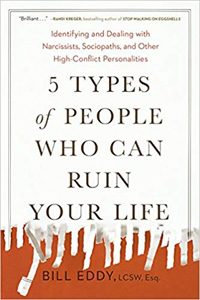 BOOK REVIEW: 5 Types of people who can ruin your life – Identifying and dealing with narcissists, sociopaths and other high-conflict personalities, by Bill Eddy, LCSW, Esq.
BOOK REVIEW: 5 Types of people who can ruin your life – Identifying and dealing with narcissists, sociopaths and other high-conflict personalities, by Bill Eddy, LCSW, Esq.
Review by Donna Andersen
Yes, millions of people with serious personality disorders have the potential to ruin your life. 5 Types of people who can ruin your life, by Bill Eddy, is the first book I’ve seen that draws attention to the multiple personality disorders that spell trouble for interpersonal relationships.
Bill Eddy is a lawyer and social worker who leads the High Conflict Institute, an organization which educates people about high-conflict personalities and high-conflict disputes. His previous book, Splitting: Protecting yourself while divorcing someone with borderline or narcissistic personality disorder, is a classic.
In this book, Eddy describes high-conflict personalities (HCPs), who he says respond to conflict by compulsively increasing them. Typically they do that by focusing on “targets of blame.” If you’re reading Lovefraud, you were probably somebody’s target of blame.
Most high-conflict personalities have one or more of five personality disorders, Eddy says. They are:
- Narcissistic personality disorder
- Borderline personality disorder
- Antisocial personality disorder (including psychopathy)
- Paranoid personality disorder
- Histrionic personality disorder
What do they have in common? Eddy identifies four primary behavior patterns:
- Lots of all-or-nothing thinking
- Intense or unmanaged emotions
- Extreme behavior or threats
- A preoccupation with blaming others — their targets of blame.
Eddy has a rule of thumb for spotting these individuals: They tend to do things that 90 percent of people would never do. He writes:
I call this the 90 Percent Rule. When you see something extremely negative, ask yourself, Would 90 percent of people ever do this? If the answer is no, you are almost always watching a high-conflict personality in action.
Explaining personality disorders
Eddy includes a chapter to explain each of the various personality disorders, often using media figures as examples of the behavior. Lance Armstrong, the cyclist who engaged in doping and then verbally attacked people who called him out on his actions, was described as a narcissist.
For each personality disorder, Eddy explains what to do about people how have them – how to avoid them, deal with them or break away from them. If you have one of these disordered individuals in your life, I think you’ll find Eddy’s advice to be helpful.
Here’s one bit of advice he offers early in the book:
Never tell someone they are a high-conflict person, or that they have a personality disorder, no matter how obvious this may seem. (Italics in the original.)
Why not? They will perceive your statement as a life-threatening attack, and will then turn you into their target of blame.
Compassion for high-conflict personalities
This book has lots of really terrific information. There are a couple of areas, however, in which I don’t agree with Eddy’s approach.
First of all, the book fails to warn readers about just how destructive people with these exploitative personality disorders are. I’ve collected 10,000 cases of people involved with HCPs (although I refer to them as “sociopaths”), and some of them are true horror stories. Even though the title of the book mentions people who can ruin your life, the content does not describe what sociopathic ruination looks like and how devastating it is.
Secondly, in my opinion, Eddy is too compassionate towards these individuals. In fact, he has a section called, “Some words of compassion.” He writes:
Regardless of the cause, having a personality disorder and/or high conflict personality makes the HCP’s own life miserable — their ability to be self-aware and change has been lost because of genetics an/or childhood environment, so they really cannot help themselves. They don’t understand that they can improve their own lives by focusing on changing themselves instead of blaming others for their conflicts and emotions.
I feel badly for people who have borderline or paranoid personality disorders. Childhood trauma is often at the root of borderline personality disorder, and that is a terrible thing for anyone to endure. People with paranoid personality disorder are delusional, and that must be awful.
But those with antisocial or narcissistic personality disorders are typically comfortable with their behavior and believe they are entitled to take advantage of others. They also know that they are hurting people, but simply don’t care.
Furthermore, antisocials, narcissists, borderlines and histrionics absolutely can control their behavior. That’s why they appear to be so normal when you first meet them. They will control their behavior until you are hooked. Then, you’ll see their true angry, disrespectful and exploitative character. But when you catch on to their games and start to withdraw, the charming behavior returns. They want to reel you back in, and they know exactly what they are doing.
Good advice if you must deal with HCPs
Overall, Bill Eddy offers very good advice if you absolutely must deal with an HCP — for example, if you’re trying to co-parent.
Most of his advice will run counter to what you really want to do. For example, he says not to criticize a narcissist, and even praise them when possible. Even though you’d have to grit your teeth while doing this, the idea is to keep the HCP from lashing out at you and making your life even more miserable than it already is.
If you can’t escape an HCP, Bill Eddy’s book will help you to cope.




































 Complex PTSD from relationships with sociopaths
Complex PTSD from relationships with sociopaths
Sunnygal
Sounds like a good book.
regretfullymine
I haven’t read this book; but the review reminds me of numerous “Christian counseling” books I’ve read (and discarded) in the past. The problem is, books like this don’t go far enough. There ARE personality disordered people out there, FAR WORSE. As for compassion..its a waste of time to show sympathy, compassion, kindness to these kind of people. It may work for a short while, but he/she will use this against you, just as they use anything else against you. The ONLY THING psychopaths understand is YOU LEAVING THEM, ASAP..whether you have children with them or not. A great many ‘Christian’ books have the same approach, often couched in language of sympathy, prayer, sessions with a pastor (good luck to that!), intervention by elders, etc. This book sounds like more of the same.
Donna Andersen
regretfullymine – actually, the book had a lot of good practical advice. The paragraph that I quoted above was pretty much the only statement about compassion.
Bill Eddy’s perspective was to offer advice to keep the disordered person from turning on you and making you the target of blame. So it was like how to not poke the bear.
Cinna
The most valuable lesson I learned from THIS site (and a few other sites) was to NOT try to “normalize” the interaction with a personality disorder. I am old enough to have gone through the “assertiveness training” phase. Of course I tried being open, clear & assertive. Of course it was a disaster with personality disorders. Huge lesson. I like the 90 percent test. So practical & bypasses the whole self doubt trap.
slimone
I read this book and really liked what it had to offer. Very practical, and the 90% rule has stuck with me. I have used it in social situations, from dinner parties to the grocery store. It just gives you permission to slowly back away, without hesitation.
I think the compassion piece is appropriate, if you define compassion in a more realistic way.
Compassion is just a feeling, and internal experience, like joy or envy. But you don’t have to ACT on compassion. You can simply feel it. It is not (always) a call to action. The art of having compassion is to know the object of your compassion and only act on it if it is a safe situation. If it isn’t you simply let that situation go with compassion for them, AND for yourself.
My mother is, I think, a Histrionic personality (though I have described her as narcissistic), and I do have compassion for her. Her childhood was total crap, and her father was a horrible pedophile. It took me years to feel compassion for her, but I actually do. Still, I have to have very firm boundaries with her, limit my time with her, and basically hear her complain a lot about how no one meets her needs (which we simply cannot do, none of us).
And I agree with the author that these people’s lives are indeed miserable. And yet, the one’s who have the highest levels of narcissism are like TEFLON, and are so shielded from the consequences of their actions and feel nothing akin to remorse, that it is very difficult to have even a modicum of compassion for them. Especially when they are making your life completely horrible.
I don’t know if any of these types could stop doing destructive, bad, selfish things, on a long term basis. I know they can in the short term, when it serves their purposes. But, I think, because this ‘good behavior’ is not driven out of care for others, but because of a perceived opportunity to GET something they want, it is only temporary.
Sunnygal
slimone Totaly agree with last sentence!!